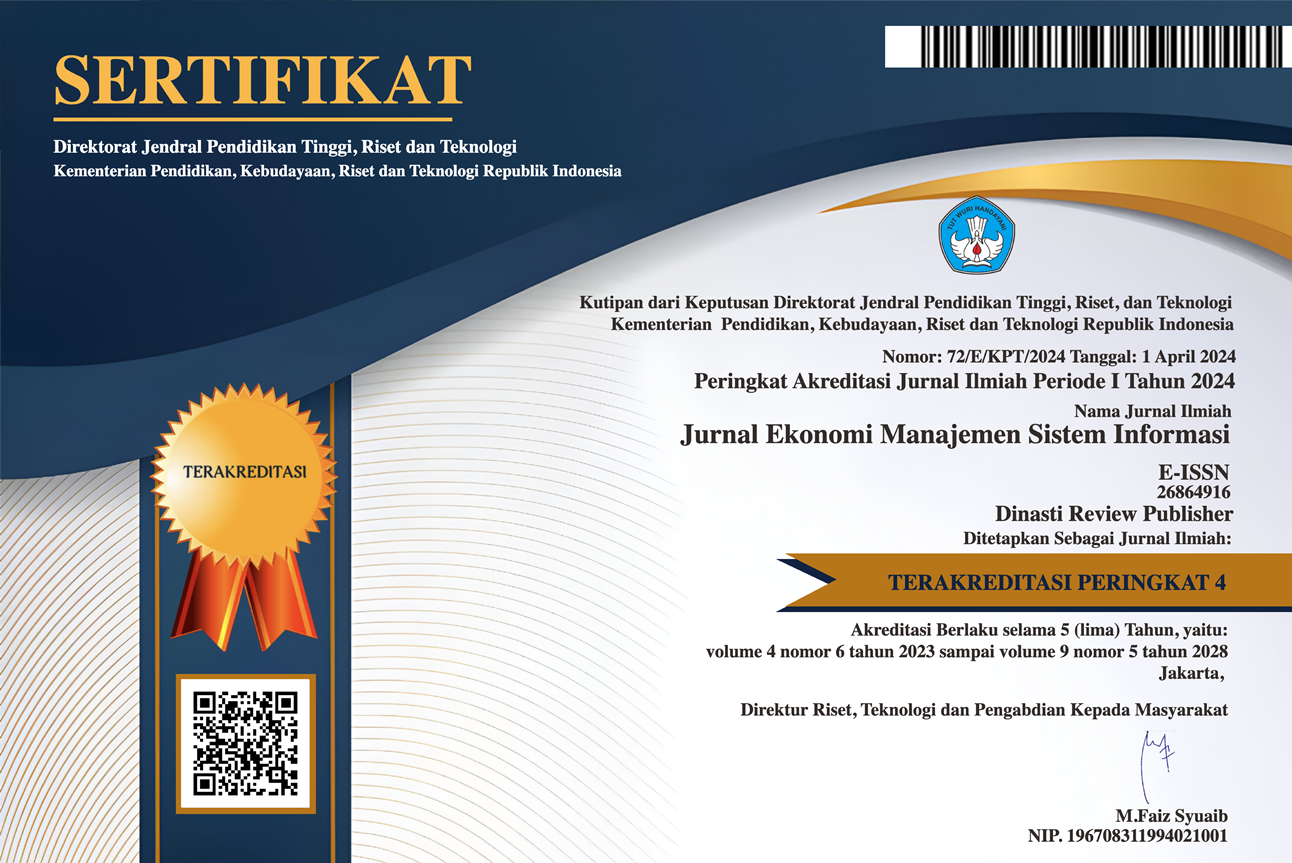Systematic Literature Review : Pengaruh Hasil Belajar Kewirausahaan dan Pelaksanaan Praktek Kerja Industri Terhadap Keputusan Rencana Karier Peserta
DOI:
https://doi.org/10.31933/jemsi.v5i3.1846Keywords:
Entrepreneurship, Students, Industrial Work Practices, Career PlansAbstract
After graduating from vocational school, students must make decisions about their career plans that will be adjusted to their abilities. This career plan can be based on the influence of their education through internship and entrepreneurship activities, because in internship activities, students are required to become employees or workers in a company. Thoughtful career planning decisions will help students develop potential areas of expertise and prepare them for work. The research design used is quantitative correlation with data collection using literature research from journals, books, documents and other relevant sources. The results of this research also show that vocational school graduates who are involved in internship activities and study entrepreneurship have sufficient skills, but they still think as workers, not as business actors. The government is expected to be tougher in telling vocational school graduates that they can create their own jobs.
References
Aprilianty, E. (2012). “Jurnal Pendidikan Vokasi”. Pengaruh Kepribadian Wiraush, Pengetahuan Kwirausahaan, dan Lingkungan terhadap Minat Berwirausaha Siswa SMK. 2, (3), 311-324.
Arisadi, A. dan Suparji. (2013). “Jurnal Kajian Pendidikan Teknik Bangunan”. Pengaruh Praktik Kerja Industri Terhadap Kompetensi Siswa SMKN 1 Sidoarjo. 3, (1), 1-9.
Arnawa, I.K. (2012). Determinasi Latihan Kerja, Kompetensi Kewirausahaan dan Bimbingan Karier Terhadap Kesiapan Kerja Siswa SMK.
Berk, L.E. (2008). Infas, Children, and Adolscent (6th Ed). USA: Pearson.
Djuwita, Efriyani. 2004. Memilih dan Mencari Kerja Sesuai dengan Bakat dan Kepribadian. Jakarta: Kawan Pustaka.
Hasan, B. dan Setiadji. (2010). Cara Praktis Membangun Wirausaha. Bandung: Pustaka Ramadhan.
Jones, B. D. et al. (2010). “Journal of Engineering Education”. An Analysis of Motivation Constructs with First-Year Engineering Students: Relationships AmongExpextancie, Values, Achievement, and Career Plans. 99, (4), 319-336.
Katz, J.A., & Green, R.P. (2009) Entrepreneurship A Wealth-creation and Value- adding Process. Singapura: Prentice Hall.
Kolb, D.A. (2014). Experiental Learning: Experience as the Source of Learning and Development. USA: Pearson Education, Inc.
Kurniasari, D. dan Gatot Isnani. (2015). “Jurnal Pendidikan Bisnis dan Manajemen”. Analisis Pelaksanaan Kerjasama SMK dengan Dunia Usaha. 1, (1), 34-40.
Nurharjadmo, W. (2008). “Spirit Publik”. Evaluasi Implementasi Kebijakan Pendidikan Sistem Ganda di Sekolah Kejuruan. 4, (2), 215-228.
Rony, Z. T., Susanto, P. C. (2023). Analysis of Employee Retention Programs and Talent Engagement to Prevent Employee Turnover in Organizations (Systematic Literature Review). Asian Journal of Community Services (AJCS) Vol.2 No. 6, 489-500.
Rony, Z. T. (2019). Generation y challenges in becoming innovative leaders at organization in the 21st century. International Jurnal of Recent Technology and Engginering.
Rony, Z. T. (2023). The Influence of Leadership, Work Culture, Motivation and Technology Acceptance on Employee Performance Moderated by the Work Environment at the Secretariat General of the Ministry of Finance. Dinasti International Journal of Management Science (DJIMS).
Setyowati, Dwi; Tusoleha Rony, Zahara; and Nurbaiti, Beti (2022) "The Effect Of Competence And Motivation On Organizational Performance At The Development Of Dinas Bina Marga Dan Sumber Daya Air Kota Bekasi (Department Of Highways And Water Resources In Bekasi City)," Journal of Strategic and Global Studies: Vol. 5: No. 2, Article 6.
Downloads
Published
How to Cite
Issue
Section
License
Copyright (c) 2024 Octa Nilam Lukkita Aga, Zahara Tussoleha Rony

This work is licensed under a Creative Commons Attribution 4.0 International License.
Hak cipta :
Penulis yang mempublikasikan manuskripnya di jurnal ini menyetujui ketentuan berikut:
- Hak cipta pada setiap artikel adalah milik penulis.
- Penulis mengakui bahwa Jurnal Ekonomi Manajemen Sistem Informasi (JEMSI) berhak menjadi yang pertama menerbitkan dengan lisensi Creative Commons Attribution 4.0 International (Attribution 4.0 International CC BY 4.0) .
- Penulis dapat mengirimkan artikel secara terpisah, mengatur distribusi non-eksklusif manuskrip yang telah diterbitkan dalam jurnal ini ke versi lain (misalnya, dikirim ke repositori institusi penulis, publikasi ke dalam buku, dll.), dengan mengakui bahwa manuskrip telah diterbitkan pertama kali di Jurnal Ekonomi Manajemen Sistem Informasi (JEMSI).










































































